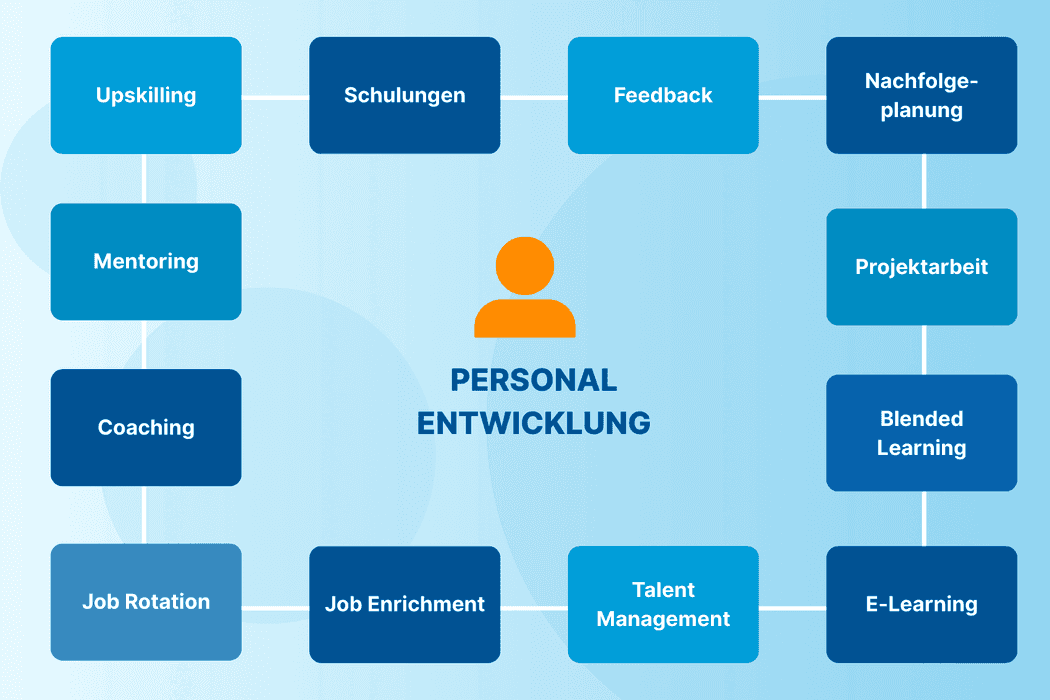How to: Talent Management
Talent management is one core area of the HR department aiming to support employees in developing their full potential. Particularly in a highly dynamic environment, it is important for a company to remain competitive and to adapt quickly to new challenges and requirements. Key to this: continuously improve your employee’s skill sets.

Definition: Talent Management
Talent management by definition describes a company's effort to support their employees in developing their skills, knowledge and competencies in the professional context. This can be achieved through targeted measures such as trainings, mentoring programs or feedback tools.
The Goal of Talent Management?
One objective is to support employees in achieving their individual l career goals. This will likely result in an increased performance and higher skill sets across employees, which in turn has a significant impact on the overall company success. On top of that,well-trained and motivated employees can exchange valuable knowledge across teams, which further improves the overall performance.. Therefore, the - indirect - f objective of talent management is to strengthen the company as a whole.
In brief: investing in the development of its employees is indispensable for the success of a company. Talent management should therefore be an important part of every company’s HR department. Not only to create a positive and productive working environment but also to offer employees a career perspective.
How to: Talent Management
Every company’s corporate philosophy as to how they allow for talent growth is different. Possible measures may include:
Trainings
Training is multi-faceted and with very different core objectives based on the chosen field. But in any case this measure will have the goal to improve your employees skills with regards to their current and future position. The upskilling approach offers an example Competence assessments provide an understanding for both, the degree to which qualifications are covered as well as where there are gaps. Instead of outsourcing those missing pieces, employees can receive training and thus upskill. , Pro tip: a personnel management system will facilitate managing and allocating training units.
Mentoring programs
Mentoring programs match experienced with less experienced employees, which provides the environment to gain valuable business insights.Other than learnings in the day-to-day business both parties involved benefit from exchanging ideas, gaining new perspectives and debating potential career paths. Usually, the mentor acts as a confidant who may as well take on a guiding role.
Coaching
A coach provides targeted support to help employees develop their skills and competencies to achieve their goals.
Job rotation
The job rotation concept involves employees moving through different departments or roles within the company in order to gain new perspectives on different career paths. Not to confuse with the concept of job sharing, which describes flexible working time models.
Job enrichment
Employees are given more responsibilities and challenges in their current roles. This allows for a continuous development of their skills.
Feedback
Regular feedback cycles aim to provide employees with constructive feedback on performance and development opportunities. A continuous dialog is important to identify and optimize work processes while recognizing the potential for improvement.
Whichever measures your company engages in to retain and develop their talents - it all comes down to implementing and monitoring those measures on a regular basis. Only then can you assess the overall effectiveness and support your employees to fully leverage their potential.
Who is Responsible for the Talent Management within a Company?
This responsibility usually lies in the combination of managers, HR and the individuals themselves. Managers are responsible for providing employees with a positive work environment and ensuring they receive the necessary resources and support. One crucial factor: establishing a nurturing corporate culture.
The HR department is responsible for planning and implementing talent management measures and for monitoring their effectiveness.
Finally, every individual needs to be actively involved in their development and take responsibility for their career path.
Of course, the whole process will need for those parties to work closely together and ensure transparent communication.
Which Measures are Suitable for which Employees?
Mentoring programs are particularly suitable for career starters and inexperienced employees. This allows them to benefit from the guidance and support of colleagues who have already gained a wide range of experience in their area. They will benefit from both, theoretical as well as practical, work insights, which supports an effective learning process. The same reasoning applies to coaching.
Employees who have already gained experience in their field might look for new challenges. Job rotations allow the employee to move to another department and corresponding requirement profiles within the company. This is usually a temporary change intended to give employees a new perspective.
Training is suitable for employees of all experience levels. Specialized training units are better suited for entry-level employees, while a more advanced training with a strategic focus is probably a better fit for experienced employees. For example: a course on optimizing specific advertising channels makes sense for entry-level marketers, while one on SEO optimization and strategic business growth is for more experienced employees.
HR Consultants
An HR consultant can assist with a company's human resource development by helping to implement human resource development strategies and programs.The HR consultant works closely with managers and employees to create individual development plans and ensure that each employee receives the resources and support needed to improve their skills and competencies. An HR consultant can thus be a valuable partner to build internal talent management structures t by helping to align the goals of the business and the needs of the employee.
Disclaimer
We would like to point out that our website provides non-binding information, which under no circumstances constitutes legal advice. This also, and especially, applies to topics within the sphere of legal HR advise. The content of this contribution cannot and is not intended to replace individual and binding legal advice. For this reason, all information provided is without guarantee of correctness and completeness, but always researched with the utmost care.